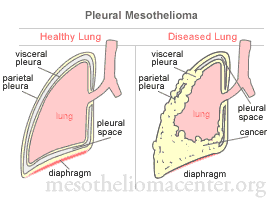

Types of Mesothelioma
- Pleural Mesothelioma : Pleural mesothelioma means that the tumor arises in the pleura or the membrane surrounding the lungs. The pleura can be divided into two layers; the visceral pleura, the layer that covers  the lungs and the parietal pleura, which line the chest wall. Between the two layers there is a space that holds a small volume of fluid that acts as a lubricant, making it possible for the two layers to slide over each other effectively as the lungs expand and contract with each breath.
the lungs and the parietal pleura, which line the chest wall. Between the two layers there is a space that holds a small volume of fluid that acts as a lubricant, making it possible for the two layers to slide over each other effectively as the lungs expand and contract with each breath.
Because of the involvement of the lung, pleural mesothelioma appears as lung problems. The person may have a pleural effusion, or abnormal accumulation of fluid in the spaces between two layers of pleural membrane. This can manifest as shortness of breath, nonproductive cough, chest pain, and difficulty of breathing. The pleural mesothelioma that affects can also cause fever, fatigue, blood in sputum, anemia and subsequent weight loss.
Most cases of mesothelioma affects the pleura, which constitute 70% of mesothelioma cases.

- Pericardial Mesothelioma : Another type of the mesothelial tissue is located on the bag that covers the heart for the protection and lubrication. It is called the pericardium.
Similar to the the mesothelial tissue, the pericardium may also be affected by mesothelioma. This kind is very deadly as it already implies the major organ of circulation. However, this form of mesothelioma is very rare and represents approximately 5% of all diagnosed cases.
The development of pericardial mesothelioma is not clearly understood. One theory is that asbestos particles may be transported from the lungs into the bloodstream which can lead to heart lining and cause chronic inflammation leading to the growth of cancerous tumors. This can cause a rapid expansion of the pericardial sac resulting from the accumulation of fluid called pericardial effusion. A person may experience chest pain, palpitations, irregular heartbeat (arrhythmia), and a certain degree of difficulty of breathing. Cancerous tumors can also metastatize (spread) to nearby organs such as the lungs.

- Peritoneal Mesothelioma :
Mesothelioma that develops in the membrane that lines the entire abdominal cavity is appointed as the peritoneal mesothelioma. Also known as abdominal mesothelioma, this type of cancer can cause severe abdominal pain and swelling due to accumulation of intraperitoneal fluid in the peritoneal membrane called ascites. It can also cause fever and increased abdominal circumference. A person may experience changes in bowel habits such as diarrhea and constipation that will eventually lead to weight loss.